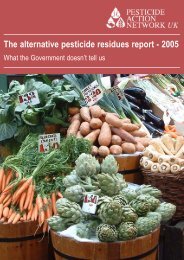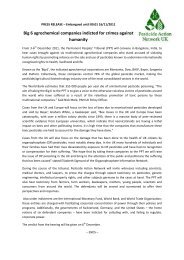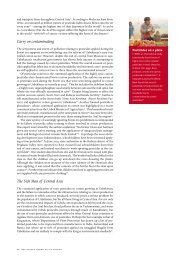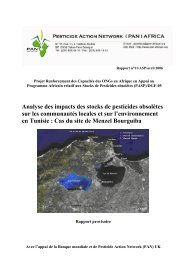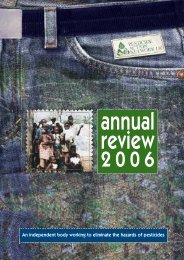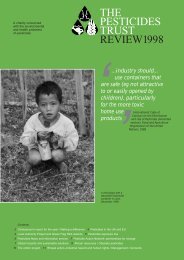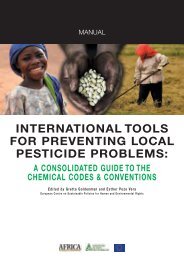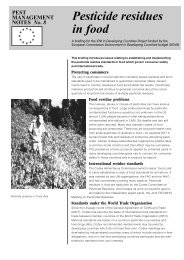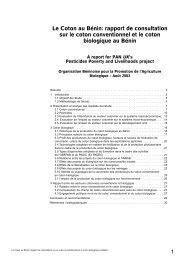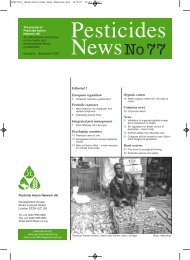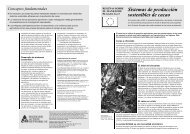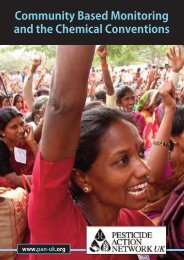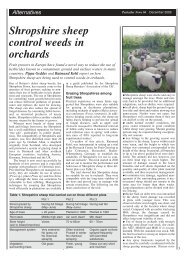Tanzania Multi Stakeholder Map - WebNG
Tanzania Multi Stakeholder Map - WebNG
Tanzania Multi Stakeholder Map - WebNG
Create successful ePaper yourself
Turn your PDF publications into a flip-book with our unique Google optimized e-Paper software.
this project are aware of this training, whether they will be taking part so as to<br />
maximise the benefits of these two initiatives. The reaction from the organisers<br />
were that they were not aware of the said training, however efforts will be made<br />
to contact the organisers of the training in Zanzibar to solicit for collaboration.<br />
One participant asked what are the objectives of the Ecotoxicological training and<br />
the reaction was that: the objectives are to train stakeholders on the use of<br />
ecotoxicologal monitoring tools to understand and increase awareness of the<br />
communities on the impacts of the pesticides. It was further commented that<br />
Ecotox is a study that enables people to analyse, assess the lifecycle of the<br />
pesticides. A manual is being developed by Greenwich University of Britain, the<br />
participants will be required to assess and comment on the suitability of the<br />
manual for <strong>Tanzania</strong> use. Further, it was queried that there is equally rampant<br />
misuse of pesticides in urban areas but why the project is not focussing on this<br />
segment of communities. The reaction was that the project will focus on generic<br />
problems and solutions, which will be relevant to all environmental settings. It<br />
was further commended that most of the projects usually focus only on capacity<br />
building, therefore we now have to think about capacity utilisation too.<br />
It was further contributed that it is a sad situation for exemption of using DDT on<br />
assumption that DDT is a silver bullet to fix malaria problems and neglecting the<br />
fact that there are other safe chemicals for malaria control. There are sad<br />
situation in South Africa where DDT spraying was done in poor areas only.<br />
Furthermore, WHO stringent application procedures cannot be met in African<br />
situation meaning that indoor DDT spraying would be more dangerous to human<br />
lives than Malaria itself. It was further noted that there are many alternatives for<br />
malaria control. In addition to that, it was highlighted that DDT targets adult<br />
mosquitoes, sustainable malaria control strategy should focus on killing even<br />
non-adult mosquitoes such as lavaes. It was then contributed that using DDT, we<br />
risk eligibility of exporting our agricultural products to developed countries due to<br />
potential high DDT residue content on agricultural products. Therefore it was<br />
commended that <strong>Tanzania</strong> applied for exemption and it has not used it at all. The<br />
exemption provide the right to use DDT especially during emergency situations<br />
e.g. during malaria epidemics and when other available and cheap alternatives<br />
fails. The application was necessitated by the fact that alternatives were more<br />
expensive than the DDT. Finally, it was commended that alternatives should be<br />
safe, effective, socially acceptable, available and easily applicable.<br />
It was further queried that, is the project focusing on a specific area of <strong>Tanzania</strong><br />
and the reaction was that the project covers the whole country and it can be seen<br />
in this workshop that participants comes from different regions. It was then asked<br />
whether the project have a budget ceiling and which professionals will be<br />
involved and the reaction was that the whole project including other countries has<br />
the total budget of 1.3 m Euros for three years and collaborate with different<br />
professionals from international organisations such as Ecosphere, PAN UK, PAN<br />
Africa, PAN AP etc. therefore the project is well equipped in terms of funds and<br />
6




